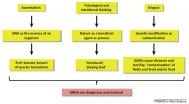(Press-News.org) (April 15th, 2015) Coeliac disease is one of the most common life-long conditions in Europe, yet many people remain undiagnosed and lengthy diagnostic delays may be putting lives at risk. Today, doctors are being urged to consider testing for Coeliac disease in anyone showing signs and symptoms of the condition and to consider screening everyone in high-risk groups.
A paper published in this month's special Coeliac disease (CD) issue of the UEG Journal assessed the viability of screening for CD in the general population and concluded that screening of first-degree relatives of people with CD, people with type 1 diabetes, iron-deficiency anaemia, Down's syndrome and other high-risk groups may be appropriate.1
"This important research highlights the value of serological testing for CD in anyone with symptoms that might be due to the condition and in all asymptomatic individuals from high-risk groups," says Professor Antonio Gasbarrini from the Gemelli University Hospital in Rome, Italy. "It is vital that we now start to take positive action across Europe to tackle this prevalent condition and reduce its serious health consequences."
A diagnosis of CD is usually made based on the presence of antibodies to gluten in the blood in addition to biopsy evidence of inflammation in the small intestine.2 However, the availability of sensitive and specific blood tests for markers of CD has raised the possibility of population-wide screening for CD in an effort to ensure earlier diagnosis and treatment of the condition.
"Coeliac disease is readily treated with a gluten-free diet, so it is unacceptable that people suffer its symptoms for many years before they are properly diagnosed" says Professor Gasbarrini. "We now have blood screening tests that are simple, safe and accurate, and it is time we started using them effectively to limit the damage caused by this common condition."
Coeliac disease is a genetically-determined, autoimmune condition caused by a permanent intolerance to gluten found in wheat, barley and rye. The condition causes inflammation in the small intestine, leading to diarrhoea, weight loss, fatigue and other non-specific symptoms. It has been estimated that around 1% of the population may have CD, although estimates vary between countries, and the prevalence of CD appears to be increasing.1 If left undiagnosed and untreated, CD can have a profound effect on quality of life,3 may lead to adverse pregnancy outcomes,4 and has been associated with a reduced life-expectancy.5
"Unfortunately, because the symptoms of CD are often vague and similar to those of irritable bowel syndrome, many people with CD are undiagnosed and many who are diagnosed will have waited 10 years or more for their diagnosis to be confirmed," says Prof. Gasbarrini. "At best, only around one-quarter of all CD sufferers are likely to have been diagnosed by a physician,6 leaving large numbers of people still at risk."
INFORMATION:
References
Ludvigsson JF, Card TR, Kaukinen K, et al. UEG Journal 2015;3(2):106-120.
Ludvigsson JF, Bai JC, Biagi F, et al. Gut 2013; 62:43-52.
Norström F, Lindholm L, Sandström O, et al. BMC Gastroenterol 2011;11:118.
Khashan AS, Henriksen TB, Mortensen PB, et al. Hum Reprod 2010;25(2):528-34.
Rubio-Tapia A, Kyle RA, Kaplan EL, et al. Gastroenterology 2009;137(1):88-93. 6. Mustalahti K, Catassi C, Reunanen A, et al. Ann Med 2010;42:587-95.
Notes to Editors
About UEG
UEG, or United European Gastroenterology, is a professional non-profit organisation combining all the leading European societies concerned with digestive diseases. Together, its member societies represent over 22,000 specialists, working across medicine, surgery, paediatrics, gastrointestinal oncology and endoscopy. This makes UEG the most comprehensive organisation of its kind in the world, and a unique platform for collaboration and the exchange of knowledge.
To advance standards of gastroenterological care and knowledge across Europe and the world, UEG offers numerous activities and initiatives, including:
UEG Week, the biggest congress of its kind in Europe, and one of the two largest in the world. MEDIA REGISTRATION NOW OPEN
UEG Education, the universal source of knowledge in gastroenterology, providing online and classroom courses, a huge online library and delivering the latest GI news, fostering debate and discussion
Training Support, funding for innovative training and educational programmes, as well as international scientific and professional co-operations
UEG Journal, published bi-monthly, covering translational and clinical studies from all areas of gastroenterology
EU Affairs, promoting research, prevention, early diagnosis and treatment of digestive diseases, and helping develop an effective health policy for Europe
Find out more about UEG's work. Visit http://www.ueg.eu
Press contact
Luke Paskins:
media@ueg
Tel: +44 (0)1444 811099
April 24, 2015 - A simple method of testing "twilight vision" gives reliable results in identifying people who have decreased visual acuity under low light conditions, according to a study in the May issue of Optometry and Vision Science, official journal of the American Academy of Optometry. The journal is published by Wolters Kluwer.
Using filters to test at a light level 100 times lower than for daylight visual acuity testing, vision care professionals can obtain "reliable and repeatable" measurements of twilight vision, report Jason S. Ng, OD, PhD, and colleagues ...
MAYWOOD, Il. - The recent Great Recession was accompanied by a significant and sustained increase in major depression in U.S. adults, according to a Loyola study published in the Journal of Clinical Psychiatry.
Prevalence of major depression increased from 2.33 percent during the years 2005-2006 to 3.49 percent in 2009-2010 to 3.79 percent in 2011-2012, according to the study by Loyola University Chicago Stritch School of Medicine researchers.
Prevalence of less-severe depression increased from 4.1 percent in 2005-2006 to 4.79 percent in 2009-2010, but then declined ...
Leesburg, VA, April 24, 2015--Digital breast tomosynthesis (DBT) increases the rate of cancer detection in women with dense breast tissue by as much as 67%, according to new research from the Einstein Medical Center in Philadelphia.
"There are a lot of data showing that screening with DBT increases cancer detection, but much less is known about the effect of density and lesion type on detection rates," said coauthor Caroline Ling. "We found a striking increase in detection among women with dense breasts called back for mass and asymmetry relative to nondense breasts."
The ...
Functional analysis of a cell, which is the fundamental unit of life, is important for gaining new insights into medical and pharmaceutical fields. For efficiently studying cell functions, it is essential to reconstruct cellular microenvironments by parallel manipulation of single cells. Various cell manipulation techniques including fluidic, optical, and electrical techniques have been developed.
However, all these techniques lack flexibility with respect to changes in the cellular types, number, and places. In addition, the manipulations, which have been conducted in ...
While seeking targets to attack Huntington's disease, an incurable inherited neurodegenerative disorder, neurobiologists of the research group led by Professor Erich Wanker of the Max Delbrück Center for Molecular Medicine in the Helmholtz Association found what they were looking for. Using a filtering strategy borrowed from criminologists, the researchers systematically filtered interaction networks of various biological databases. In several steps, they increasingly narrowed down their search until they ultimately found the protein (CRMP1). In subsequent lab experiments ...
Dropping off a child at kindergarten for the first time can be one of the most memorable yet terrifying experiences of parenthood. Among the many concerns parents face is the worry whether your child will make friends - a key factor, research shows, in reducing anxiety, depression and the likelihood of being bullied.
For parents of children with disabilities, the concern is even greater as four-out-of-10 of their children will enter kindergarten without the social skills necessary to develop close friendships. The response from schools has been to create inclusive classrooms, ...
A new technique that identifies how genes are controlled could help scientists spot errors in the genetic code which trigger disease, a study suggests.
The method focusses on those parts of DNA - known as enhancer regions - which regulate the activity of genes and direct the production of proteins that have key functions within the body.
Errors in protein production can result in a wide range of diseases in people, researchers say.
The new method could help researchers pinpoint the source of disease-causing mutations in enhancers. Until now, these genetic errors ...
ANN ARBOR, Mich. -- Nearly half of American hospitals aren't taking key steps to prevent a kind of gut infection that kills nearly 30,000 people annually and sickens hundreds of thousands more - despite strong evidence that such steps work, according to a new study.
While nearly all of the 398 hospitals in the study use a variety of measures to protect their patients from Clostridium difficile infections, 48 percent haven't adopted strict limits on the use of antibiotics and other drugs that can allow the dangerous bug to flourish, the researchers report.
Hospital ...
This news release is available in German. The world is a risky place. But our subjective fears and anxieties are often at odds with the evidence. New findings by scientists at the Max Planck Institute for Human Development and the University of Konstanz show that subjective fears about potential risks may be amplified in social exchange. Their findings have now been published in the journal Proceedings of the National Academy of Sciences (PNAS).
In our information society, information about risks such as Ebola and measles can spread like wildfire - be it through ...
A team of Belgian philosophers and plant biotechnologists have turned to cognitive science to explain why opposition to genetically modified organisms (GMOs) has become so widespread, despite positive contributions GM crops have made to sustainable agriculture. In a paper published April 10 in Trends in Plant Science, they argue that the human mind is highly susceptible to the negative and often emotional representations put out by certain environmental groups and other opponents of GMOs. The researchers urge the general public to form opinions on GMOs on a case-by-case ...



